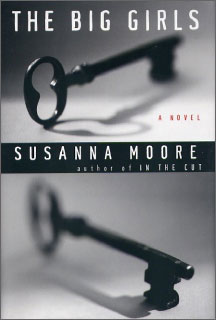 |
 Susanna Moore
Susanna Moore
The Big Girls
Reviewed by: Rick Kleffel © 2007
Alfred A. Knopf / Random House
US First Edition Hardcover
ISBN 978-1-4000-4190-9
224 Pages; $24
Publication Date: 05-01-2007
Date Reviewed: 05-22-2007
Index:
Mystery
General Fiction
Horror
Stories multiply without our consent, without our knowledge. Susanna Moore's 'The Big Girls' is never a single, simple story, though each component slots easily into place. But as the story unfolds, it splits, swirls, creating narratives in the reader's mind without the reader's permission and seemingly without any effort on the part of the writer. In the same way that the mind organizes what the eye sees into a cognizable image, the reading experience organizes 'The Big Girls' into a story. Moore has the skill to let the reader do the reading, to let the reading become part of the act of writing, of telling the story. We're invested in the novel because it allows our participation. Our perception of the story brings the story to life.
'The Big Girls' is told from four perspectives; that of Dr. Louise Forrest, the head of psychiatry at Sloatsburg women's prison, Helen, an inmate, incarcerated for killing her children, Angie, a sketchy would-be starlet, and Ike Bradshaw, a corrections officer at Sloatsburg. As the novel begins, Dr. Forrest marks her sixth month at Sloatsburg, and continues her treatment of Helen. At first, we switch between mainly between Helen's Dr. Forrest's story. But as Angie and Ike begin to speak to us, we realize that the relationships here are a lot more complicated than we ever could expect. The story is deeper, darker, and more insidious than we can imagine. But then, Moore leaves little to the imagination.
Though the tale is told in four separate voices, there's never any confusion as to who is speaking. Moore's characterizations are wrought with an almost effortless, unaffected prose style. Each segment is short, and the cues as to who is speaking are subtle but never overly obvious. It quickly becomes apparent that Helen is quite mentally ill — she is, after all, in a psychiatric prison — but Moore only gradually reveals the extent and the reasons behind Helen's illness. It also quickly becomes apparent that Dr. Forrest has her own troubled history, with an ex-husband, Rafael, and a boy named Ransom. Angie's voice comes as a breath of fresh air, at first almost comic relief. But there's little comedy in this novel that uncovers one dark deed after another and keeps plunging deeper into the morass of human cruelty.
The darkness in 'The Big Girls' could scare off a lot of readers with good reason. Moore is unflinching in her willingness to shine a light on the grimmest and most horrific human behaviors. She explores the depravity not just through the lives of the characters, but uses the prison setting effectively to tell one horror story after another. And just when you think you've escaped from the actual prison, you'll find the prisons within the minds of the characters to be just as fertile ground for dark deeds. Moore does not revel in discomfort, but she's willing to present the most unpleasant thoughts and experiences with a dispassionate eye, using her storytelling technique with almost unbearable accuracy.
What keeps 'The Big Girls' from becoming a wallow through the swamp of human awfulness is Moore's ability to engage the reader in the storytelling experience, to make the reader complicit in imagining the worst that can happen before it manages to happen. There's a savage joy in the fierce power of storytelling at work here. Moore knows how we create narratives, how we wring meaning from the random acts of violence and horror that infuse our lives. Her narrative power is a joy in itself. It is a beautiful painting of unimaginable horror. We open our eyes. We bring it to life.
|
 |
